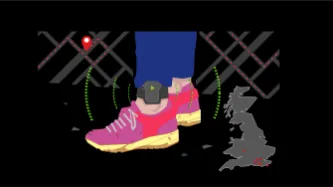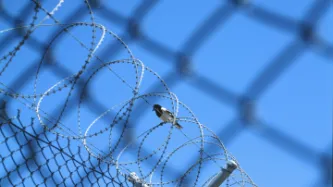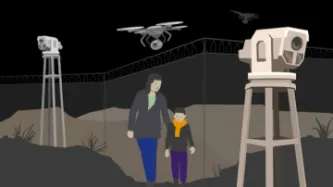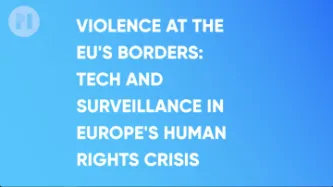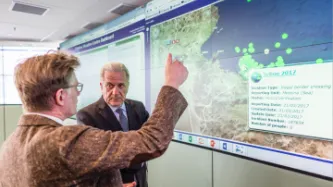Search
Content type: Advocacy
Privacy International welcomes the UK House of Lord’s Justice and Home Affairs Committee’s investigation and subsequent report on electronic monitoring.The UK currently monitors some individuals who have interacted with the criminal justice system, and all individuals released on bail from immigration detention, through fitted GPS tags and non-fitted monitoring devices.In the immigration context, the Home Office touts electronic monitoring as a less restrictive way to maintain contact with…
Content type: Long Read
On the basis of a year of legal research by PI as well as documents obtained by other civil society organisations, and evidence provided by legal representatives fighting these automated systems on behalf of their clients, on the 18th August 2025, we issued a formal complaint to the UK Information Commissioner (ICO) regarding the UK Home Office’s use of two ‘automated recommendation-making tools’ (ARMTs), the Identify and Prioritise Immigration Cases tool (IPIC) and the Electronic Monitoring…
Content type: News & Analysis
We’ve been asked a lot lately about whether it is safe to travel, particularly to the US. And it’s not surprising why: the US Government is increasing their cruelty at borders.Border management today is fueled by our data, but government officials want more. They want as much data as they can get to catch you out. They’ve reportedly detained or deported people based on their free speech activities, denying entry on tenuous grounds like having the wrong photos on phones (including in in the ‘…
Content type: Long Read
18th December is International Migrants Day, a day to recognize both the contributions and continued struggles of migrants across the world.Migrants continue to face an increased level of human rights violations through hostile immigration policies and practices. At borders and beyond, their fundamental human rights and dignity are being violated through old and new technologies. These systems in place reinforce the dehumanising rhetoric of migrants, who are merely seeking asylum and a better…
Content type: News & Analysis
On 15 May 2024, a London Administrative Court handed down its judgment in the case of ADL & Ors v Secretary of State for the Home Department, just two months after another court judgment and a ruling of the UK's data protection authority (ICO). The four Claimants in this latest case (including asylum seekers and survivors of trafficking) were challenging the UK Home Office's policy of placing people released from immigration detention under 24/7 GPS surveillance - either by shackling them…
Content type: Advocacy
Privacy International had suggested the Human Rights Committee consider the following recommendations for the UK government:Review and reform the IPA 2016 to ensure its compliance with Article 17 of the ICCPR, including by removing the powers of bulk surveillance;Abandon efforts to undermine the limited safeguards of the IPA 2016 through the proposed Investigatory Powers Amendment Bill;Refrain from taking any measures that undermine or limit the availability of encrypted communications or other…
Content type: Long Read
18th December is International Migrants Day. It’s a day designated by the United Nations, dedicated to recognising the “important contribution of migrants while highlighting the challenges they face.”On this day we wish to recognise in particular the countless human rights violations that people experience at borders and within hostile immigration systems. We thank those who survive these violations for sharing with us and others their experiences of such violations, and for accepting to…
Content type: Advocacy
Dejusticia, Fundación Karisma, and Privacy International submitted a joint stakeholder report on Colombia to the 44th session of the Universal Periodic Review at the UN Human Rights Council.Our submission raised concerns regarding the protection of the rights to freedom of expression and opinion, to privacy, and to personal data protection; the shutdown of civil society spaces; protection of the right to protest; and protection of the rights of the Venezuelan migrant and refugee population.…
Content type: News & Analysis
Privacy International (PI) has today filed complaints with the Information Commissioner (ICO) and Forensic Science Regulator (FSR) against the UK Home Office's use of GPS ankle tags to monitor migrants released on immigration bail. This policy and practice represents a seismic change in the surveillance of migrants in the UK. PI was first alerted to this scheme by organisations such as Bail for Immigration Detainees, an independent charity that exists to challenge immigration detention in the…
Content type: Advocacy
Today, PI filed a complaint with the Forensic Science Regulator (FSR) in relation to quality and accuracy issues in satellite-enabled Global Positioning System (GPS) tags used for Electronic Monitoring of subjects released from immigration detention (GPS tags). We are concerned there may be systemic failures in relation to the quality of data extracted from tags, processed and interpreted for use in investigations and criminal prosecutions.
The GPS tags are used by the Home Office to…
Content type: Advocacy
Privacy International (PI) welcomes the call of the Special Rapporteur on the human rights of migrants to assess the human rights impact of current and newly established border management measures with the aim of identifying effective ways to prevent human rights violations at international borders, both on land and at sea.
The issues highlighted in the call for submissions are ones that PI has been investigating, reporting and monitoring as part of our campaigns demanding a human rights…
Content type: Video
Links
Josoor International Solidarity’s website is at https://www.josoor.net
No Name Kitchen’s website https://www.nonamekitchen.org
Border Violence Monitoring Network’s Website is at https://www.borderviolence.eu
Their reports documenting violence and trends in Greece and the Balkans route are at https://www.borderviolence.eu/category/monthly-report/
Lighthouse Report’s investigations on pushbacks in the Aegean are available at https://www.lighthousereports.nl/investigation/…
Content type: News & Analysis
2022 will see a raft of high tech surveillance tools emerging in the UK government’s arsenal, which will further entrench a ‘hostile environment’ for migrants. Compounding this further, immigration officers will increasingly be using digital forensic tools such as 'mobile phone extraction' under a veil of secrecy. This raises serious concerns about overreach, misuse and abuse of power, the actual quality and integrity of the data they gather, and independent oversight of these powers. But it…
Content type: News & Analysis
A new industry is offering border agencies around the world access to advanced space-based surveillance capabilities once reserved for the most advanced intelligence agencies. Using satellites able to track signals from satellite phones and other emitters, these companies are then selling access to the data obtained to anyone willing to pay, including UK and EU border agencies.
While such surveillance can and is being used to save lives, it can also be used for illegal ‘pull backs’ in…
Content type: News & Analysis
A new report by the UN Working Group on mercenaries analyses the impact of the use of private military and security services in immigration and border management on the rights of migrants, and highlights the responsibilities of private actors in human rights abuses as well as lack of oversight and, ultimately, of accountability of the system.
Governments worldwide have prioritised an approach to immigration that criminalises the act of migration and focuses on security.
Today, borders are not…
Content type: Explainer
In the name of reinforcing migration control and increasing security, the EU is introducing a host of new surveillance measures aimed at short-term visitors to the Schengen area. New tools and technologies being introduced as part of the visa application process and the incoming “travel authorisation” requirement include automated profiling systems, a ‘pre-crime’ watchlist, and the automated cross-checking of numerous national, European and international databases. There are significant risks…
Content type: Long Read
Over the last two decades we have seen an array of digital technologies being deployed in the context of border controls and immigration enforcement, with surveillance practices and data-driven immigration policies routinely leading to discriminatory treatment of people and undermining peoples’ dignity.And yet this is happening with little public scrutiny, often in a regulatory or legal void and without understanding and consideration to the impact on migrant communities at the border and…
Content type: Advocacy
To the Members of the European Parliament and to the Committee on Budgets of the European Parliament
The EU urgently needs to step up and provide assistance to protect the health and safety of people trapped in camps on the Greek islands - not just to protect their welfare, but to contain the virus itself as a matter of global public health.
However, as we detail in the briefing below, the current European Commission proposal for funds allocation is insufficient to ensure the safety of…
Content type: Long Read
This research is the result of a collaboration between Grace Tillyard, a doctoral researcher in the Media, Communications and Cultural Studies department at Goldsmiths College, London, and Privacy International.
Social Protection Systems in the Digital Age
In the digital age, governments across the world are building technologically integrated programmes to allow citizens to access welfare payments. While smart and digital technologies hold the potential to streamline administrative…
Content type: News & Analysis
Photo: The European Union
“Border Externalisation”, the transfer of border controls to foreign countries, has in the last few years become the main instrument through which the European Union seeks to stop migratory flows to Europe. Similar to the strategy being implemented under Trump’s administration, it relies on utilising modern technology, training, and equipping authorities in third countries to export the border far beyond its shores.
It is enabled by the adoption…
Content type: Long Read
Photo: Francesco Bellina
Driven by the need to never again allow organised mass murder of the type inflicted during the Second World War, the European Union has brought its citizens unprecedented levels of peace underpinned by fundamental rights and freedoms.
It plays an instrumental role in protecting people’s privacy around the world; its data protection regulation sets the bar globally, while its courts have been at the forefront of challenges to unlawful government surveillance…
Content type: Examples
In November 2018, 112 civil liberties, immigrant rights groups, child welfare advocates, and privacy activists wrote a letter to the heads of the US Department of Health and Human Services and the Department of Homeland Security demanding an immediate halt to the HHS Office for Refugee Resettlement's practice of using information given them by detained migrant children to arrest and deport their US-based relatives and other sponsors. The policy began in April 2018, and the result has been that…
Content type: News & Analysis
US Immigration and Customs Enforcement (ICE), the agency at the centre of carrying out President Trump’s “zero tolerance” approach to immigration enforcement and family separation, has for years been contracting a US surveillance company to intercept peoples’ communications across the United States. The wide potential scope for the use of the powers raises concerns about their use for the real-time surveillance of people, families, and communities caught up in Trump’s immigration crackdown…
Content type: News & Analysis
According to the International Organization for Migration, an estimated 258 million people are international migrants – that is, someone who changes their country of usual residence, That’s one in every 30 people on earth.
These unprecedented movements levels show no sign of slowing down. It is predicted that by 2050, there will be 450 million migrants across the world.
Nowadays, it is politically acceptable to demonise migrants, and countless leaders have spewed divisive and xenophobic…
Content type: Explainer
What is SOCMINT?
Social media intelligence (SOCMINT) refers to the techniques and technologies that allow companies or governments to monitor social media networking sites (SNSs), such as Facebook or Twitter.
SOCMINT includes monitoring of content, such as messages or images posted, and other data, which is generated when someone uses a social media networking site. This information involves person-to-person, person-to-group, group-to-group, and includes interactions that are private and…
